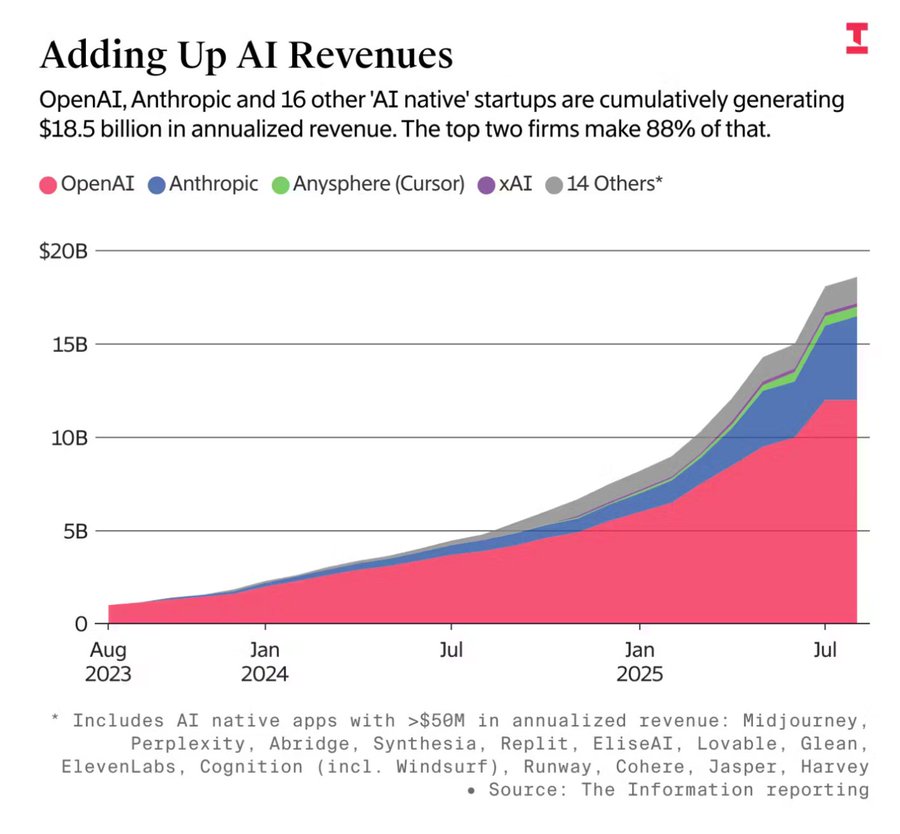Sam Altman will become Supreme Leader of the Universe. That is, if OpenAI is the first to accomplish the nebulous "AGI". Three years ago OpenAI shook the world with the launch of ChatGPT. Today, small companies you've never heard of are throwing their hat in the ring for perhaps the biggest prize of all time. Investors are too busy finding the next highest bidder to even discuss what the hell the prize itself is.
Soon AGI will be a national security risk. For now we should all sit back, relax, and watch things get crazier.
Choosing the Winning Horse
The playing field for who will accomplish AGI is trimming, fast. Major players (Inflection, Adept, Character) have given up on training frontier models. What's left is three live players (OpenAI, Anthropic, Deepmind), and a small set of worthy opponents (Meta, xAI, Microsoft, Thinking Machines, SSI, and the Chinese labs). Due to the Bitter Lesson, the high costs of compute, and monopolies on human talent, only a few can realistically pursue the goal of AGI.
The ability to scale within the current deep learning paradigm is limited primarily to hyper scalers, who need to spend billions of dollars per quarter just to keep the show running. Talent density, high-barriers to entry, and data feedback loops suggest a monopolistic market structure in which a few firms dominate the rest. Open AI and Anthropic have such an incredible head start, it will be difficult for anyone to disrupt their existing distribution.

Choosing who the winner is is a job for investors. How, where and what to look for tells us much more about the shape of AGI, and how it all unfolds. Furthermore, I'm willing to go as far to say the winner is just as likely to be crowned by individuals, as it is to be determined by market forces. [1]
Dark Horses
There are two major components that very likely will disrupt the market, and both are drastically underpriced. The most Situationally Aware have been shouting this from the rafters for a while, and there is alpha in looking in the right places.
Government Intervention
AGI doesn't just promise infinite riches and UBI, but also complete military supremacy. Soon it will be obvious that AGI secrets are our most prized secrets. Preserving the existing balance of power is the USG's primary interest in intervening, and explicit policy initiatives from our adversaries compel us towards real competition. Current policy makers have already demonstrated the political willpower to act (CHIPS Act, Intel stake). In the almost certain scenario that AI progress continues we can assume intervention, likely proportional, to its perceived impact.
Perhaps even more compelling, the United States Government has strong priors of intervening in markets. Particularly for groundbreaking technologies, this is not their first rodeo. [2]
Intervention necessarily brings significant market distortions, introducing significant volatility to any prediction we can make today. The nature of the intervention will predict the ensuing changes: nationalization of the largest lab likely will create a monopoly, while a national cluster could democratize training resources.[3] Government Intervention completely defined key US industries in the past, we have credible grounds this may be the case again.
Outlier Algorithmic Improvements
Algorithms play a unique role in AI development in that they are unpredictable, and particularly capital efficient. The scaling hypothesis prioritizes compute, but a substantial algorithmic improvement could throw a wrench in this paradigm. An algorithm with 1,000x impact is not unlikely; discoveries like back-propagation, or the transformer architecture are clearly within the distribution of things that can happen. Even hardware improvements offer similar outlier effects. An incredible algorithmic improvement could make the data center wars obsolete.
Outcomes vary widely in this scenario. A tight lipped firm like SSI could capture all of the value from AGI [4]. A Chinese company could open source the algorithm, and make AGI a public good. The market price for the best researchers is $100m+, because firms understand the importance of talent to this end.
Recent history demonstrates this exact story of irrational exuberance, leading us to underweight technological risks. During the dot-com bubble Telecom companies lost nearly double the market cap of Internet companies. This was a story of fiber optic glut, not pets.com. Two algorithmic improvements in the early 2000s destroyed the business model of fiber optic after a decade of infrastructure buildout. The industry never recovered, and customers benefitted from lightning fast, cheap data transmission (to this day). [5]
In a weird sci-fi way, "the algorithm" could be everything.
Alas
The modal outcome is that the winners keep winning. One of the hyperscalers achieves AGI, and the aftermath looks like Uber vs. Lyft.[6] The tail outcomes for this market are much fatter than what the market is pricing in. On one end, the USG is the kingmaker, and by putting dollars and political support behind a hyperscaler, crowns the winner. On the other end, a smaller lab opens-sources a compute efficient algorithm, writing each data-center investment to zero.
The world is going to get crazier, just make sure you're looking it in the eyes when it happens.
The most entertaining outcome is the most likely. - Elon Musk
Footnotes:
1. Since some people like predictions, as of today my bet is on Anthropic
2. Historical Intervention in Energy, Railroads, and Telecom have determined entire markets
3. What direction government policy takes towards the labs is completely up in the air.
4. SSI is thus probably undervalued
6. After billions invested, Uber trades at a $200bn market cap, Lyft at $7bn